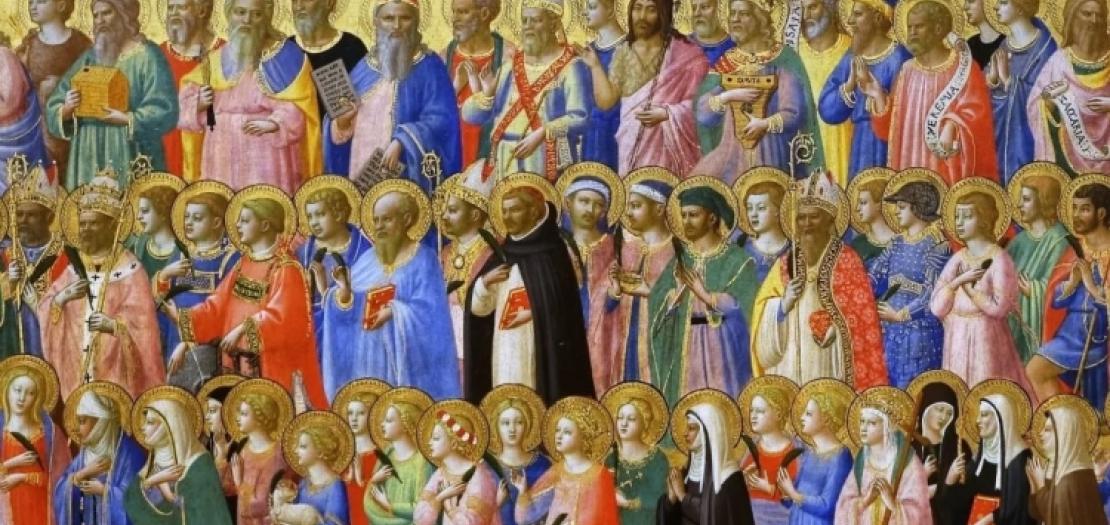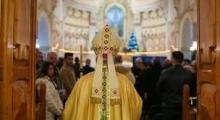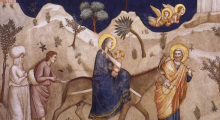Issued by the Catholic Center for Studies and Media - Jordan. Editor-in-chief Fr. Rif'at Bader - موقع أبونا abouna.org

Following is the text of the meditation by His Beatitude Cardinal Pierbattista Pizzaballa, Latin Patriarch of Jerusalem, on the 6th Sunday of ordinary time C, dated February 16, 2025:
The Gospel passage for this 6th Sunday of Ordinary Time (Luke 6:17, 20-26) recounts Jesus' words on the Beatitudes.
The evangelist sets this discourse in a flat place, or rather, in a place where Jesus is descending (Lk 6:17). He was on the mountain where he prayed and where he chose and called his disciples. (Luke 6:12) Now he descends and stops in the plain, where he finds a large crowd waiting for him.
They are mainly poor people: sick, hungry, possessed, people who have been wounded by life. (Luke 6:18-19)
The first thing Jesus does is not to heal them, to help them, but to go among them and stop. Jesus did not come primarily to change people's lives by solving problems, healing everyone and always, He comes down and remains in their midst, making himself one of them.
Jesus comes down, stops and then begins to heal them. In short, he does not begin with his thaumaturgical work, through which he frees them from various illnesses, but with a Word that gives them a new perspective on their own lives.
This new view is summarized in four beatitudes and four corresponding "woes": Blessed are you who are poor, blessed are you who hunger, blessed are you who weep, blessed are you who are hated. (Luke 6:20-22) And parallel to this: Woe to you who are rich, woe to you who are full, woe to you who laugh, woe to you when everyone will say good things about you. (Lk 6:24-26)
There is one great beatitude in the Bible that summarizes all the countless beatitudes with which the Old and New Testaments are littered, namely that of knowing the Lord.
This is our calling, our greatest joy: to know Him. That is our bliss.
Jesus sees in these people before him the first recipients of this promise of joy; he sees people who will be put in a position to know God. They will come to know Him, not because He will change their destiny for the better, but because of the simple fact that He descended to them; because He descended into the depths of humanity and found them waiting for Him, with their desire to listen to Him and be saved. And there He stopped.
So Jesus is not saying that the poor are blessed because they become rich: that is not the justice He wanted to bring. It would still be a purely human justice that would change the lot of all and create new riches, but also new poor. There would be nothing really new.
The poor are blessed because the Kingdom of God belongs to them, that is, because they can recognize God.
The blessed are therefore those whom life has enabled to experience God.
It is the experience that God gives life and that only He can do this. Blessed are those whom history has placed in a position to understand that every other place where we seek life sooner or later reveals its deceptive face: Wealth, satiety, pleasure, honor and fame - not that they are negative or sinful realities. They are just incapable of giving eternal life because they keep people trapped in a state where everything is already there, where there is nothing left to look forward to or hope for.
Blessed is the one who knows that life is also other, and who expects this other from God with trust.
This awareness often comes at the price of great hardship, great suffering.
And those who suffer are not blessed because they suffer, but because this suffering is a great and valuable school of truth: the truth that we are not enough for ourselves, that we cannot make it in our own strength, that our nets are empty even after a night of work, as we saw last Sunday. (Luke 5:5)
And that is the point at which the Lord comes down and stops.
+ Pierbattista







